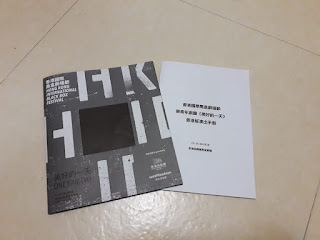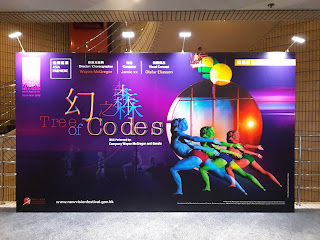What a Wonderful Hong Kong (One Fine Day - HKIBBF review)
15 Oct 2018 | Ashley
I have spent most of my conscious time trying to accept my humanity, and I think I have achieved that. Being vulnerable is important. Being vulnerable in front of people is a therapeutic experience. It is indeed a pleasure to have an ear. Having someone feel safe before you and be completely naked is also a pleasure. I enjoy that kind of interaction the most, where we feel safe, vulnerable and simply, human.
Recently, Hong Kong Repertory Theatre (香港話劇團) and West Kowloon (西九文化區) co-operated on a festival named Hong Kong International Black Box Festival. Their aim is to bring daring productions from around the world to Hong Kong. On 11 Oct, 2018, I watched a show called One Fine Day (美好的一天), directed by Beijing-based director, Li Jianjun, at the HKRep Black Box. It was indeed a very avant-garde experiment which surprisingly grew emotionally intimate as the show progressed.
What was unusual when the audience first settled into the room was the request to follow a man on stage about how to use the headphone and radio with which we were provided. The man next to me gave me weird glances. It was indeed a suspicious thing to do in a black box theatre. Anyhow, we followed through. This was nonetheless a good build-up for the mystery ahead.
When the lights dimmed, the little door at the corner opened with a glimpse of light. 19 performers entered and sat at the edge of the stage one after another. They are not professional actors. In fact, they are people from all walks of life with stories to tell. I watched someone pushed a tray to the middle of the stage. Then there was an abrupt, almost absurd blast of confetti falling from above, like a pathetic sad party. Soon, each of these performers took their chairs to what was drawn on the floor as their designated channels, e.g. FM97.0, which resemble real radio channels, and started talking. It was not long before everyone was talking to the audience at the same time. With voices overlapping, it was impossible to not put on the headphones and tune the radio to specific channels for a better listen.
Gradually, I saw myself in some of these people. Although it was impossible to follow everyone on every bit of their stories, I did find myself gravitating towards a few people and going back to them back and forth. Some of them broke into tears as they were speaking, talking about their families and realisations of the world. I found myself leaning forward more and more since I grew an affection towards some of them. An audience member even walked up the stage and gave one of them a tissue. Some people, later revealed during the Q&A session, thought this presentation to be a torture and inconvenience since they could never hear every one of them. Yet I thought this method of presentation exactly manifested the idea of human beings being different and similar in ways which prompt us to relate to everyone at different levels. It also brought about the importance of finding your own tribe, and in a way reflected the chaotic composition and unstable understanding of the world and life itself.
The sound effect in this production is especially outstanding, and peculiar. I later found out that the tray in the middle held several boilers where water was boiled. As time went by, they would make alarming sounds when the temperature climaxed, to which a performer would attend when the sound reached unbearable squeaks. Director Li commented after the show that this served as a reminder of the act of listening and being the voyeur of a particular person. It is also a reminder to switch to another person's story without fixating on one. Putting this production into context, the Hong Kong version must be very different from the former Mainland Chinese versions. Someone during the Q&A session suggested an interpretation of the occasional ridiculous blast of confetti and the increasingly animate and aggressive sound of fireworks towards the end, which I find applicable. They suggested the implication of the increasingly dangerous phenomenon of Hong Kong losing its freedom of speech as these seemingly celebratory sounds of for example, the National Day, interrupted speakers from expressing themselves.
All in all, I really liked this production. It gave me a fuzzy feeling after watching it. I saw each performer as human and some of them as my friends. It would be lovely to actually have a conversation with them. This proves once again that Hong Kong houses wonderful stories and people who are willing to share and be bravely open and vulnerable to inspire. This was indeed an amazing thought to take home.
I have spent most of my conscious time trying to accept my humanity, and I think I have achieved that. Being vulnerable is important. Being vulnerable in front of people is a therapeutic experience. It is indeed a pleasure to have an ear. Having someone feel safe before you and be completely naked is also a pleasure. I enjoy that kind of interaction the most, where we feel safe, vulnerable and simply, human.
Recently, Hong Kong Repertory Theatre (香港話劇團) and West Kowloon (西九文化區) co-operated on a festival named Hong Kong International Black Box Festival. Their aim is to bring daring productions from around the world to Hong Kong. On 11 Oct, 2018, I watched a show called One Fine Day (美好的一天), directed by Beijing-based director, Li Jianjun, at the HKRep Black Box. It was indeed a very avant-garde experiment which surprisingly grew emotionally intimate as the show progressed.
What was unusual when the audience first settled into the room was the request to follow a man on stage about how to use the headphone and radio with which we were provided. The man next to me gave me weird glances. It was indeed a suspicious thing to do in a black box theatre. Anyhow, we followed through. This was nonetheless a good build-up for the mystery ahead.
When the lights dimmed, the little door at the corner opened with a glimpse of light. 19 performers entered and sat at the edge of the stage one after another. They are not professional actors. In fact, they are people from all walks of life with stories to tell. I watched someone pushed a tray to the middle of the stage. Then there was an abrupt, almost absurd blast of confetti falling from above, like a pathetic sad party. Soon, each of these performers took their chairs to what was drawn on the floor as their designated channels, e.g. FM97.0, which resemble real radio channels, and started talking. It was not long before everyone was talking to the audience at the same time. With voices overlapping, it was impossible to not put on the headphones and tune the radio to specific channels for a better listen.
Gradually, I saw myself in some of these people. Although it was impossible to follow everyone on every bit of their stories, I did find myself gravitating towards a few people and going back to them back and forth. Some of them broke into tears as they were speaking, talking about their families and realisations of the world. I found myself leaning forward more and more since I grew an affection towards some of them. An audience member even walked up the stage and gave one of them a tissue. Some people, later revealed during the Q&A session, thought this presentation to be a torture and inconvenience since they could never hear every one of them. Yet I thought this method of presentation exactly manifested the idea of human beings being different and similar in ways which prompt us to relate to everyone at different levels. It also brought about the importance of finding your own tribe, and in a way reflected the chaotic composition and unstable understanding of the world and life itself.
The sound effect in this production is especially outstanding, and peculiar. I later found out that the tray in the middle held several boilers where water was boiled. As time went by, they would make alarming sounds when the temperature climaxed, to which a performer would attend when the sound reached unbearable squeaks. Director Li commented after the show that this served as a reminder of the act of listening and being the voyeur of a particular person. It is also a reminder to switch to another person's story without fixating on one. Putting this production into context, the Hong Kong version must be very different from the former Mainland Chinese versions. Someone during the Q&A session suggested an interpretation of the occasional ridiculous blast of confetti and the increasingly animate and aggressive sound of fireworks towards the end, which I find applicable. They suggested the implication of the increasingly dangerous phenomenon of Hong Kong losing its freedom of speech as these seemingly celebratory sounds of for example, the National Day, interrupted speakers from expressing themselves.
All in all, I really liked this production. It gave me a fuzzy feeling after watching it. I saw each performer as human and some of them as my friends. It would be lovely to actually have a conversation with them. This proves once again that Hong Kong houses wonderful stories and people who are willing to share and be bravely open and vulnerable to inspire. This was indeed an amazing thought to take home.
Blog sponsor: ESLteachers (www.eslteachersjob.com)



Comments
Post a Comment